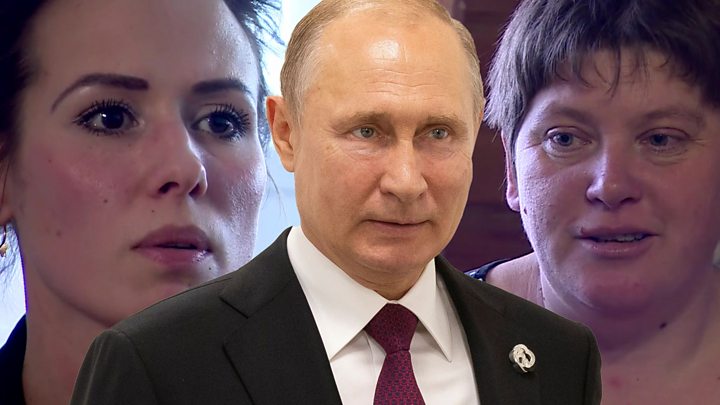President Vladimir Putin has announced a series of plans to increase the number of children being born in Russia from an average birth rate of under 1.5 per woman to 1.7 within four years.
Last year he promised tax breaks for bigger families.
On Wednesday he told parliament "the birth rate is falling again" before pledging state funding for new mothers.
"Maternity capital" has until now only been paid to families with at least two children.
Welfare benefits will also be paid for children aged three to seven in low-income families, and free school meals will be provided for the first four years of school.
 Ordinary Russians have taken to appealing directly to Putin to solve their problems
It has picked up in recent years and, although the population is currently 147 million, the Russian leader spoke of a "very difficult demographic period" in which the children of the 1990s were now themselves giving birth.
"Russia's fate and its historical outlook depend on how many of us there are," he said.
Ordinary Russians have taken to appealing directly to Putin to solve their problems
It has picked up in recent years and, although the population is currently 147 million, the Russian leader spoke of a "very difficult demographic period" in which the children of the 1990s were now themselves giving birth.
"Russia's fate and its historical outlook depend on how many of us there are," he said.
Why birth rate is a problem beyond Russia
Several Eastern European states are struggling with a declining birth rate. Only last week, Hungary's right-wing nationalist Prime Minister, Viktor Orban, announced plans for free fertility treatment to couples as well as possible income tax exemptions for mothers with three or more children. Mothers with four children already have some tax breaks in Russia, a country that has a birth rate of 1.48. The EU average is 1.59 births per woman and several states including Spain, Italy, Greece and Malta are well below the Russian figure. Russia's population has struggled to recover from a dramatic decline in the 1990s, to the point that Mr Putin said by 1999 the birth rate had fallen to 1.16, lower even than during World War Two. Ordinary Russians have taken to appealing directly to Putin to solve their problems
It has picked up in recent years and, although the population is currently 147 million, the Russian leader spoke of a "very difficult demographic period" in which the children of the 1990s were now themselves giving birth.
"Russia's fate and its historical outlook depend on how many of us there are," he said.
Ordinary Russians have taken to appealing directly to Putin to solve their problems
It has picked up in recent years and, although the population is currently 147 million, the Russian leader spoke of a "very difficult demographic period" in which the children of the 1990s were now themselves giving birth.
"Russia's fate and its historical outlook depend on how many of us there are," he said.
What else did Putin say?
This was Mr Putin's 16th annual address to Russia's parliament, the Duma, and Mr Putin used his speech to also tackle his own future. His fourth presidential term comes to an end in 2024, and under the constitution, he would have to stand down from the post. While saying he wanted to maintain Russia's presidential system, Mr Putin proposed a referendum on changing the constitution to give parliament greater powers to appoint the prime minister. Between his second and third terms, Mr Putin served for four years as prime minister before returning to the presidency in 2012, and in theory, he could become prime minister again. Even when he was prime minister, Mr Putin was widely seen as the power behind then-President Dmitry Medvedev.DISCLAIMER: The Views, Comments, Opinions, Contributions and Statements made by Readers and Contributors on this platform do not necessarily represent the views or policy of Multimedia Group Limited.
Latest Stories
-
Auditor-General calls for stricter checks on public officials’ asset declarations
26 minutes -
Kotoko first team resumes training Wednesday, but club declines participation in official competitions
40 minutes -
2 suspects arrested at Akatsi for allegedly possessing human blood
46 minutes -
University of Ghana launches Corporate Football League
2 hours -
Mahama swears in Council of State members
3 hours -
Africa Health Collaborative KNUST concludes successful 3rd annual emergency preparedness workshop
3 hours -
Alex Mould takes over as MiDA CEO from Michael Asare Bediako
3 hours -
Africa-specific research key to tackling continent’s health challenges, says GSK’s Dr. Juliet Addo
3 hours -
We’ll remove pre-mix coordinators to ensure direct fuel delivery to fisherfolk – Fisheries Minister
4 hours -
318 mining-related licenses commenced in Akufo-Addo’s last 6 days in office
4 hours -
JKA Ghana organises two-day training for karate practitioners in Accra
4 hours -
Nkwanta South MP donates relief items to aid affected families in conflict
4 hours -
Communication Minister orders shutdown of Gumah FM in Bawku over security concerns
4 hours -
GCB Bank MD calls on Chief Imam
4 hours -
National Economic Dialogue to start from March 3, 2025
4 hours

